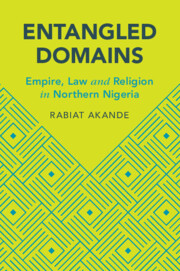Book contents
- Entangled Domains
- Cambridge Studies in Law and Society
- Entangled Domains
- Copyright page
- Dedication
- Contents
- Acknowledgments
- Note on Terms
- Introduction
- Part I Governing Faith
- Part II Constituting Difference
- Chapter Three The Construction of Minorities
- Chapter Four The Making of the 1958 Penal Code
- Chapter Five Constituting Rights
- Part III Imagining the Past
- Bibliography
- Index
- Cambridge Studies in Law and Society
Chapter Four - The Making of the 1958 Penal Code
from Part II - Constituting Difference
Published online by Cambridge University Press: 18 May 2023
- Entangled Domains
- Cambridge Studies in Law and Society
- Entangled Domains
- Copyright page
- Dedication
- Contents
- Acknowledgments
- Note on Terms
- Introduction
- Part I Governing Faith
- Part II Constituting Difference
- Chapter Three The Construction of Minorities
- Chapter Four The Making of the 1958 Penal Code
- Chapter Five Constituting Rights
- Part III Imagining the Past
- Bibliography
- Index
- Cambridge Studies in Law and Society
Summary
This chapter chronicles the late colonial state’s elimination of Islamic law from public law through a Penal Code rooted in imperial law. The transformation of Islamic law since the inception of colonial rule belied the early colonial state’s claim to retaining Islamic criminal law. Nevertheless, the formal retention of the Shari’a in public law through Islamic criminal law had been a distinct feature of Northern Nigeria, underlining the formal status of Muslim elites and Islamic law. In response to the concerted criticism of missionaries, and senior colonial officials, the 1958 reforms abrogated the ceremonial status of Islamic law. Even as the 1958 Penal Code removed all illusions of the retention of Islamic law, administrators and Muslim elites legitimated the reform exercise by invoking Islamic legal authority, particularly the practice of Muslim societies. That discourse capaciously expanded the state’s power to regulate the content of Islamic law by re-casting the state’s Sharia-constrained siyasa jurisdiction as an expansive siyasa whose constitutional boundaries are drawn by the modern state. By so doing, the 1958 reforms sealed the state’s prerogative to govern religion.
Keywords
Information
- Type
- Chapter
- Information
- Entangled DomainsEmpire, Law and Religion in Northern Nigeria, pp. 144 - 188Publisher: Cambridge University PressPrint publication year: 2023
